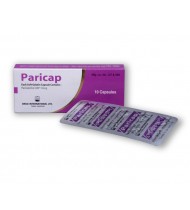Paricalcitol
Indications
Chronic Kidney Disease Stages 3 And 4: Paricalcitol capsules are indicated in adults and pediatric patients 10 years of age and older for the prevention and treatment of secondary hyperparathyroidism associated with Chronic Kidney Disease (CKD) Stages 3 and 4.
Chronic Kidney Disease Stage 5: Paricalcitol capsules are indicated in adults and pediatric patients 10 years of age and older for the prevention and treatment of secondary hyperparathyroidism associated with CKD Stage 5 in patients on hemodialysis (HD) or peritoneal dialysis (PD).
Chronic Kidney Disease Stage 5: Paricalcitol capsules are indicated in adults and pediatric patients 10 years of age and older for the prevention and treatment of secondary hyperparathyroidism associated with CKD Stage 5 in patients on hemodialysis (HD) or peritoneal dialysis (PD).
Pharmacology
Paricalcitol is a synthetic, biologically active vitamin D analog of calcitriol with modifications to the side chain (D2) and the A (19-nor) ring. Preclinical andin vitro studies have demonstrated that paricalcitol's biological actions are mediated through binding of the VDR, which results in the selective activation of vitamin D responsive pathways. Vitamin D and paricalcitol have been shown to reduce parathyroid hormone levels by inhibiting PTH synthesis and secretion.
Dosage & Administration
Usual Adult Dose for Secondary Hyperparathyroidism:
Initial dose:Stage 3 or 4 Chronic Kidney Disease (CKD): Initial dosing is based on baseline intact parathyroid hormone (iPTH):
- 500 pg/mL or less: 1 mcg orally daily OR 2 mcg orally 3 times a week
- Over 500 pg/mL: 2 mcg orally daily OR 4 mcg orally 3 times a week
- Starting dose (micrograms) = baseline iPTH level (pg/mL)/80
- Starting dose is given orally 3 times a week; only start if baseline serum calcium has been adjusted to 9.5 mg/dL or lower.
Usual Pediatric Dose for Secondary Hyperparathyroidism:
Safety and efficacy have not been established in pediatric patients. The following is dosing used in a very small pediatric trial. No data are available on children under 5 years old.Initial dose, children 5 to 18 years: 0.04 mcg/kg three times per week if baseline intact parathyroid hormone (iPTH) is less than 500 pg/mL 0.08 mcg/kg three times per week if baseline iPTH is 500 pg/mL or higher. Injected as a bolus dose through a hemodialysis vascular access port at any time during dialysis
Maximum frequency: Every other day
Interaction
Digitalis; ketoconazole & other strong P450 3A inhibitors including atazanavir, clarithromycin, indinavir, itraconazole, nefazodone, nelfinavir, ritonavir, saquinavir, telithromycin, voriconazole. May interfere absorption with cholestyramine (cap only). Increased risk of hypercalcemia with prescription-based phosphate or vit D-related medicinal products & Ca-containing prep or thiazide diuretics. Mg- & Al-containing prep (eg, antacids, phosphate-binders).
Contraindications
Hypersensitivity, Hypercalcemia, hypervitaminosis D
Side Effects
Nausea, Vomiting, Edema, Palpitation, Chills, Pneumonia, Lightheadedness, GI bleeding, Flu, Sepsis, Hypokalemia, Hypercalcemia, Increase in blood creatinine
Pregnancy & Lactation
This drug should not be used during pregnancy unless the benefit outweighs the risk to the fetus.
- AU TGA pregnancy category: C
- US FDA pregnancy category: C
Precautions & Warnings
Excessive administration of vitamin D compounds, including Paricalcitol Capsules, can cause over suppression of PTH, hypercalcemia, hypercalciuria, hyperphosphatemia, and adynamic bone disease.
Therapeutic Class
Thyroid drugs & hormone
Paricap Capsule 1 mcg
IndicationsChronic Kidney Disease Stages 3 And 4: Paricalcitol capsules are indicated in adults and ..
25.00Tk.
Showing 1 to 1 of 1 (1 Pages)

